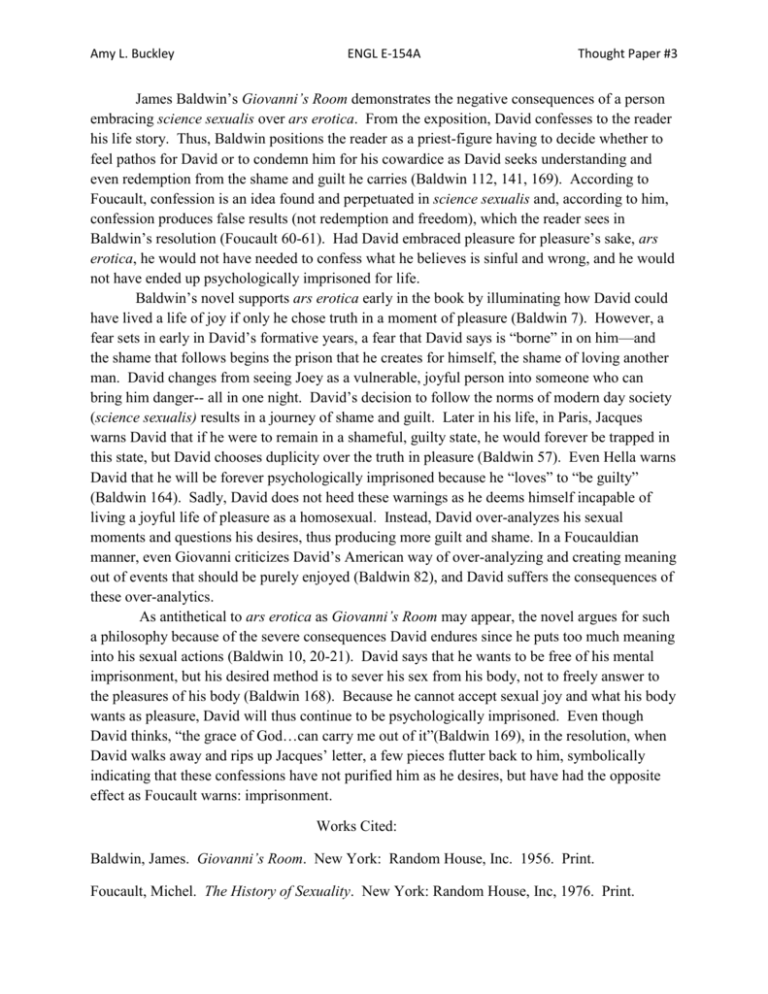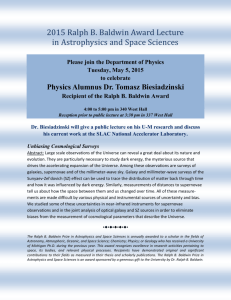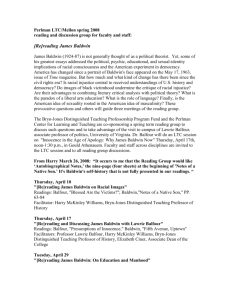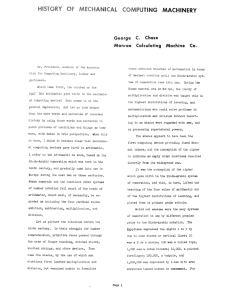Amy L. Buckley ENGL E-154A Thought Paper #3 James Baldwin`s
advertisement

Amy L. Buckley ENGL E-154A Thought Paper #3 James Baldwin’s Giovanni’s Room demonstrates the negative consequences of a person embracing science sexualis over ars erotica. From the exposition, David confesses to the reader his life story. Thus, Baldwin positions the reader as a priest-figure having to decide whether to feel pathos for David or to condemn him for his cowardice as David seeks understanding and even redemption from the shame and guilt he carries (Baldwin 112, 141, 169). According to Foucault, confession is an idea found and perpetuated in science sexualis and, according to him, confession produces false results (not redemption and freedom), which the reader sees in Baldwin’s resolution (Foucault 60-61). Had David embraced pleasure for pleasure’s sake, ars erotica, he would not have needed to confess what he believes is sinful and wrong, and he would not have ended up psychologically imprisoned for life. Baldwin’s novel supports ars erotica early in the book by illuminating how David could have lived a life of joy if only he chose truth in a moment of pleasure (Baldwin 7). However, a fear sets in early in David’s formative years, a fear that David says is “borne” in on him—and the shame that follows begins the prison that he creates for himself, the shame of loving another man. David changes from seeing Joey as a vulnerable, joyful person into someone who can bring him danger-- all in one night. David’s decision to follow the norms of modern day society (science sexualis) results in a journey of shame and guilt. Later in his life, in Paris, Jacques warns David that if he were to remain in a shameful, guilty state, he would forever be trapped in this state, but David chooses duplicity over the truth in pleasure (Baldwin 57). Even Hella warns David that he will be forever psychologically imprisoned because he “loves” to “be guilty” (Baldwin 164). Sadly, David does not heed these warnings as he deems himself incapable of living a joyful life of pleasure as a homosexual. Instead, David over-analyzes his sexual moments and questions his desires, thus producing more guilt and shame. In a Foucauldian manner, even Giovanni criticizes David’s American way of over-analyzing and creating meaning out of events that should be purely enjoyed (Baldwin 82), and David suffers the consequences of these over-analytics. As antithetical to ars erotica as Giovanni’s Room may appear, the novel argues for such a philosophy because of the severe consequences David endures since he puts too much meaning into his sexual actions (Baldwin 10, 20-21). David says that he wants to be free of his mental imprisonment, but his desired method is to sever his sex from his body, not to freely answer to the pleasures of his body (Baldwin 168). Because he cannot accept sexual joy and what his body wants as pleasure, David will thus continue to be psychologically imprisoned. Even though David thinks, “the grace of God…can carry me out of it”(Baldwin 169), in the resolution, when David walks away and rips up Jacques’ letter, a few pieces flutter back to him, symbolically indicating that these confessions have not purified him as he desires, but have had the opposite effect as Foucault warns: imprisonment. Works Cited: Baldwin, James. Giovanni’s Room. New York: Random House, Inc. 1956. Print. Foucault, Michel. The History of Sexuality. New York: Random House, Inc, 1976. Print.











